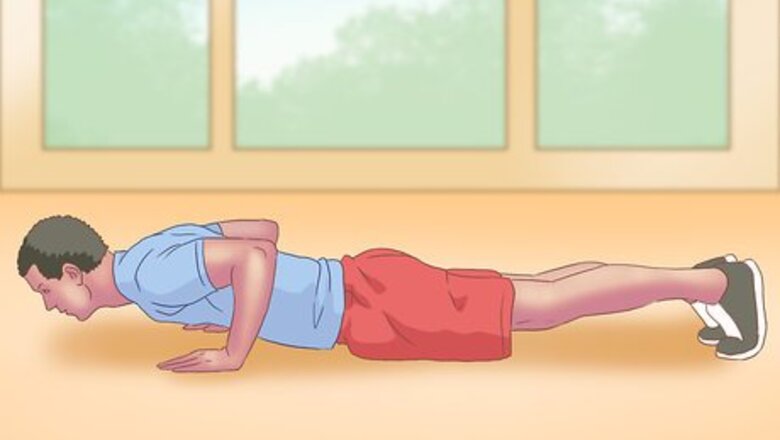
views
Push Ups
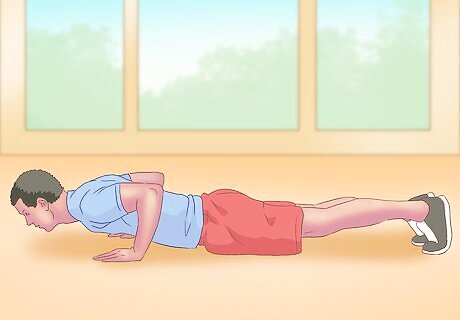
Lie on your stomach on the ground. Keep your legs together and straight out behind you. Put your palms flat on the floor next to your shoulders, fingers pointed forward. Your forearms should be approximately a shoulder-width apart. Support your body weight with your toes and forearms. Keep your torso level with the floor. Your elbows should be bent, pulled in close to your body and pointed back.
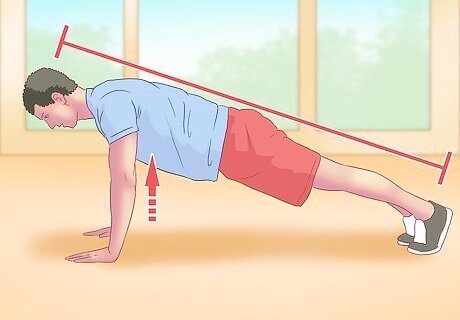
Push your body up with your arms. Keep both palms flat and firmly on the ground. Push up and then extend through the elbows until your arms are in straight-arm plank position. Your torso should be rigid to keep your core engaged. Tuck your elbows close to your body. Squeeze your glutes.
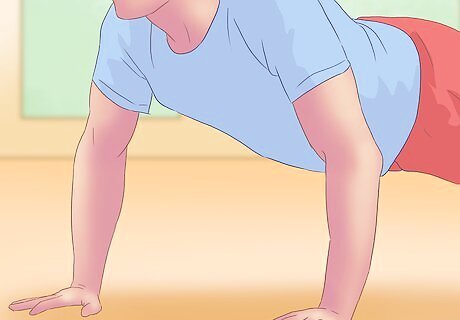
Flex your elbows and lower your body slowly to the ground. When your chest touches the floor, slowly push back up into the straight-arm plank position. For maximum stability, put the pressure of your weight on the outside of your hands. This also prevents injuries. Keep your shoulders firm and your back stable. Avoid using the bottom of your hands and your wrists to hold your weight.
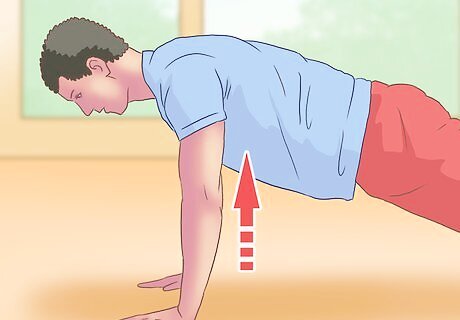
Push back up into the straight-arm plank. Keep your hips and torso straight to engage your abs. If this feels too difficult, modify the push up by dropping down to your knees (instead of holding your legs straight).
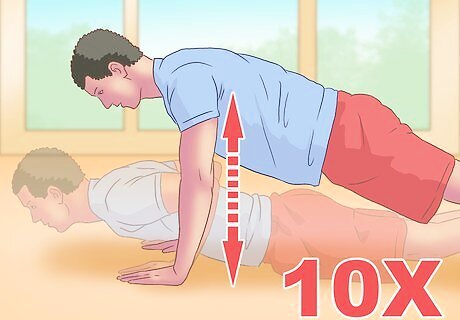
Start with three sets of 10 reps. Rest for 60 seconds between sets. To build mass, you must consistently increase the reps at each session. Minimizing rest time between sets will also build mass. If 10 is too many, drop down to five reps and work your way up from there.
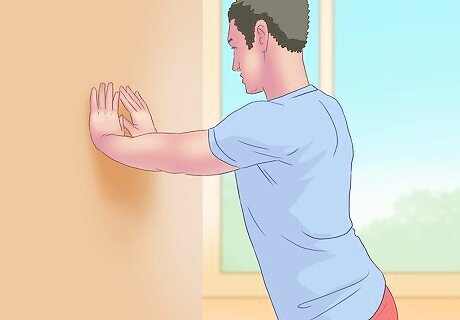
Add standing wall push ups to your routine. This is a modification of the traditional push up. Stand an arm’s length away from a sturdy wall and put your palms flat on the wall. Palms should be at shoulder height. Position your hands so that your thumbs are touching.
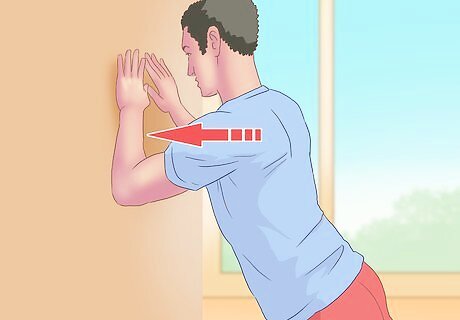
Press your body toward the wall. Keep your elbows pulled in close to your body. Push back up by extending through the elbows, just like a traditional push up, until your arms are straight. Start with three sets of 10 reps. Rest for 60 seconds in between sets. If 10 is too many, drop down to five reps and work your way up from there. Increase the intensity and decrease the rest time consistently to build mass.
Dips
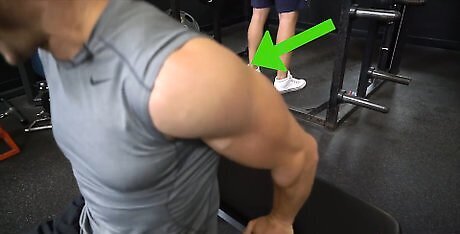
Be careful. Whenever you do dips, you should be careful and cognizant of your shoulder joint. Do your dips with a smaller range of motion at first, and then increase it over time. Always keep your shoulders squared and your shoulder blades retracted throughout the exercise. Doing this will keep your shoulder joint safe and work your muscles correctly.
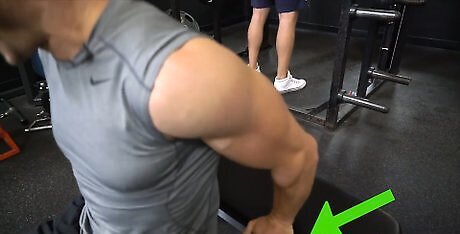
Sit down on a bench. Grip the edge of it with your hands. Your hands should be placed just outside of your hips, facing forward. Keep your head facing forward. Tuck your elbows close to your body.
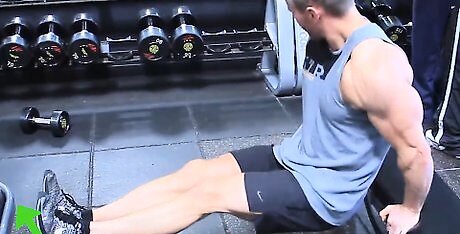
Stretch your legs out in front of you. Your heels should be resting on the ground. Toes should be pointing straight up at the ceiling.
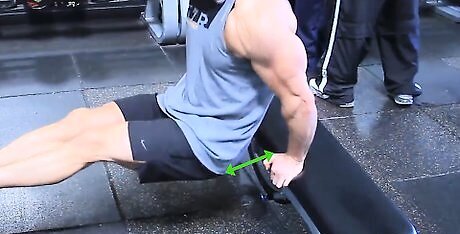
Lift your body off the bench and forward about 2 inches. Extend through the elbows so that you’re holding your body up with straight arms. Hold yourself steadily and keep your core engaged. Keep your heels on the ground and your legs out straight, leg muscles engaged. Your forearms should be pointing down.
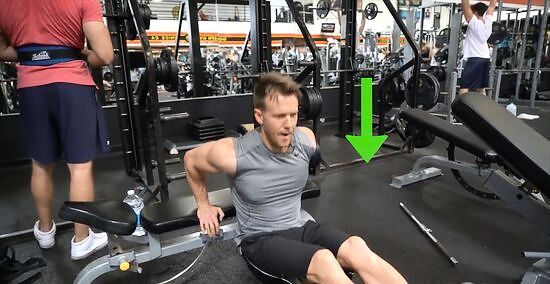
Lower your glutes to the floor slowly. Inhale as you go down. Keep lowering until your arms are at 90 degree angles. Pause for a beat. Then slowly push your body back up into the starting position. Keep your elbows pointing straight behind you. Keep your core engaged.
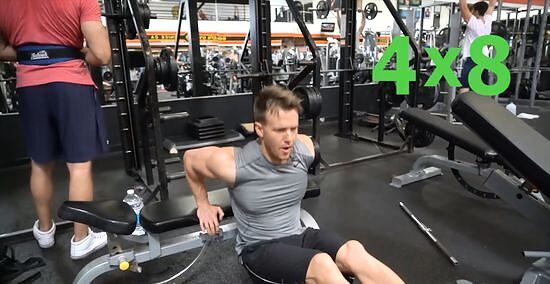
Start with 4 sets of 8 reps. Rest for 60 seconds in between sets. To build mass, you must consistently increase the reps at each session. Minimizing rest time between sets will also build mass. If 8 reps is too many, drop down to five reps and work your way up. You know you are doing the right number of reps when the last one is difficult.
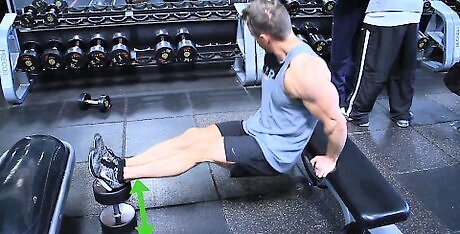
Modify the exercise by adding another bench. For a more challenging dip, place another bench a few feet in front of you. Get into position by putting your heels on the bench in front of you. Your body will be in a "L" shape.
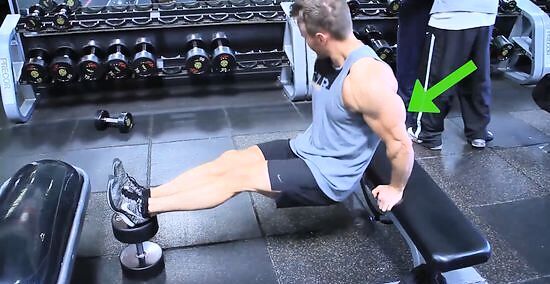
Lower your glutes to the floor. Stop when your arms are at 90 degree angles. Pause for one beat, then use your arms to push your body back into the "L" starting position. To modify the dip even more, try placing a weight across your lap before you begin, then proceed as normal. It’s best to have a partner help you with this move.
Overhead Dumbbell Extensions
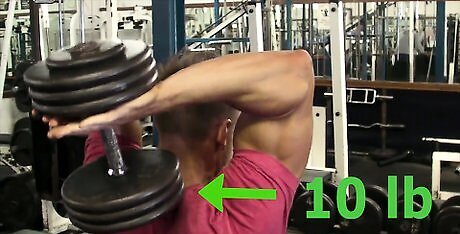
Start with a 10 pound dumbbell. Adjust the weight up or down to fit your needs. You'll know you're doing the right number of reps when the last one is difficult to complete.
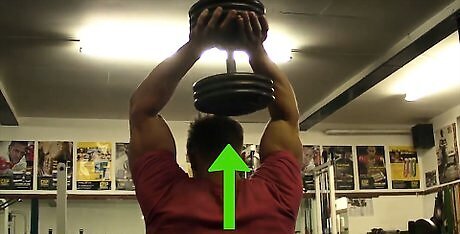
Hold the dumbbell overhead with both hands. You can be sitting or standing. Keep your feet together and flat on the floor. Hold your torso firmly with abs engaged. Keep your back straight. Your elbows will be pointing forward. Keep them tucked close to your ears.
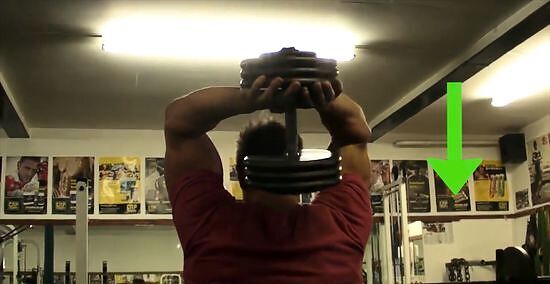
Bend your elbows and lower the dumbbell. Stop when the dumbbell is positioned directly behind your head. Keep your head facing forward.
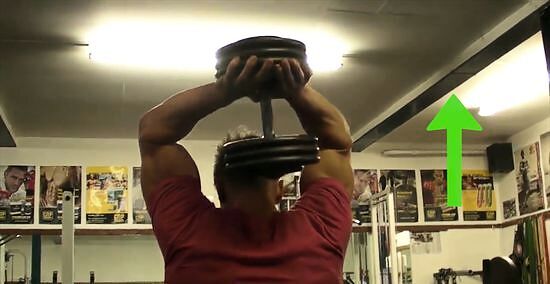
Raise the dumbbell back up. Extend your arms at the elbow to bring the dumbbell back up to the starting position. Keep your core and your glutes engaged as you make this movement. Keep your movements slow and controlled for maximum effect.
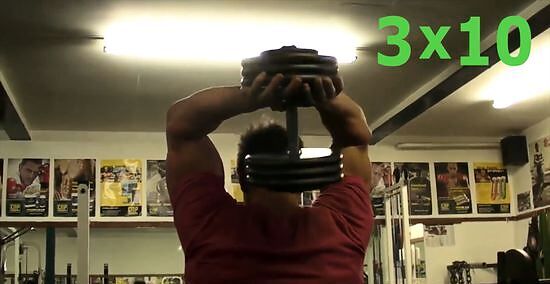
Do three sets of 10 reps. Rest for 60 seconds in between sets. Build mass by consistently adding more reps to your set. Do 2 sessions per week. If ten is too many, drop down to five and increase at each session. You know you are doing the right number of reps when the last one is difficult.
Nose Breakers, or Lying Tricep Extensions
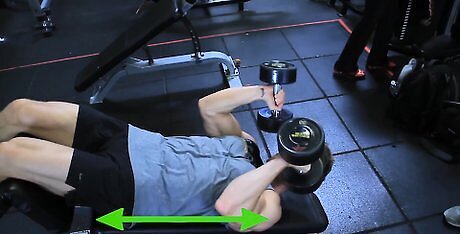
Lie down on a weight bench. You can put your feet on the floor or rest them on top of the bench. Keep your back flat and neutral throughout this entire exercise.
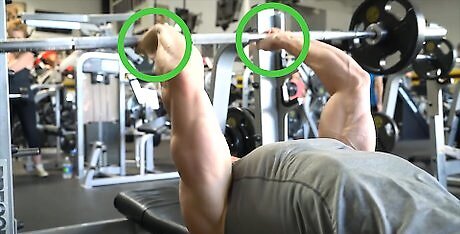
Hold a bar with two hands. Bring it in towards your chest, and then push it up. Hold it right over your face, so that your arms are perpendicular to your body. You could also use a dumbbell in each hand. You should experiment to determine how much weight you want to use. You should have enough for doing three sets of 10 reps, where the last rep or two is really challenging.
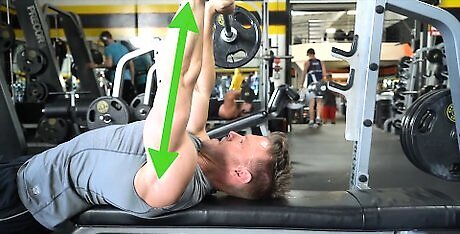
Keep your shoulder, elbow, and wrist on the same vertical line. Your hands might have to move closer together on the bar to achieve this line.
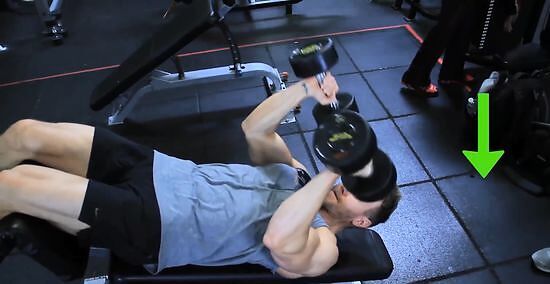
Bend your elbows. At the end of the range of motion, they should be at a right angle. They should travel past your face and behind your head. Do not go farther than 90 degrees with your elbow angle. Keep your body and your upper arm still. Beginning at the top, going down past your head, and then coming back up to the top (the vertical line) counts as one rep.
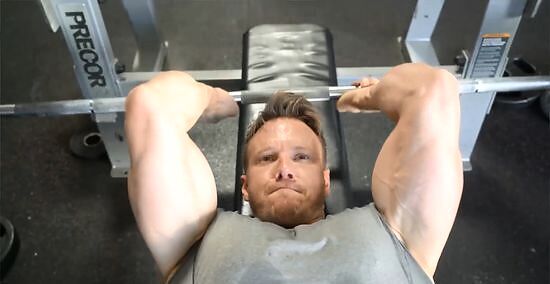
Repeat desired number of reps and sets. These can sometimes hurt your elbows, so it's better to do a high number of reps (10-15) per set. You should also do these with lower weight. If these start to hurt your elbows, switch up your tricep routine so that you're doing them less often.
Dumbbell Kickbacks
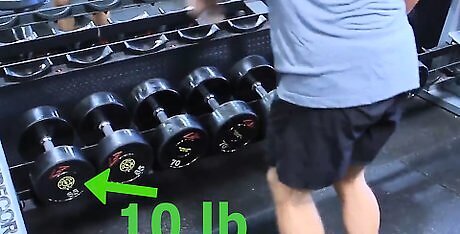
Start with a 10 pound dumbbell. Adjust the weight up or down to fit your needs. You'll know you're doing the right number of reps when the last one is difficult to complete.
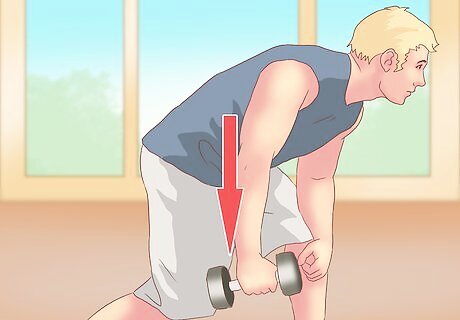
Stand with your left foot forward, dumbbell in right hand. Bend at the knee and lean forward so that your torso is almost parallel to the ground. Keep your back straight and your shoulders facing forward. Your back leg should remain straight. Let your right hand (holding the dumbbell) hang free in a relaxed position. If you need additional stability, rest your left hand on something nearby, such as a stool or bench.
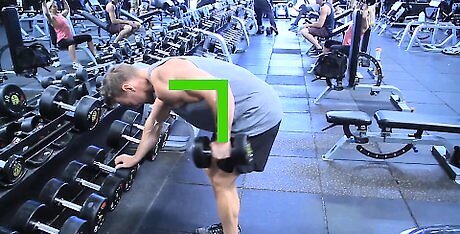
Bend at the elbow and lift your right arm to shoulder height. Your upper arm should be parallel with the ground. The dumbbell should be pointed up toward the sky. Keep your upper arm pulled in close to your body.
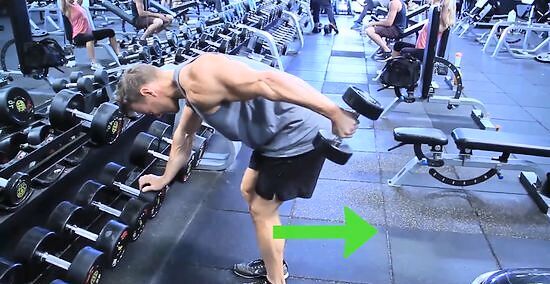
Extend your right elbow back and straighten your arm. Keep your back straight and abs engaged. The strain should peak when you fully straighten your arm. At the top of your range of motion, turn your hand so that your palms are faced upwards, towards the sky.
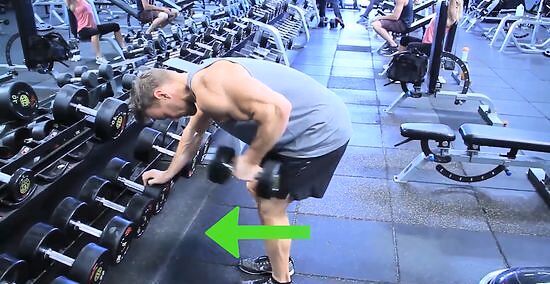
Bend at the elbow to return to the starting position. Keep your elbow pulled in close to your body. Hold it steady and don’t allow your it to drop. Keep the tempo of your movement slow and controlled.
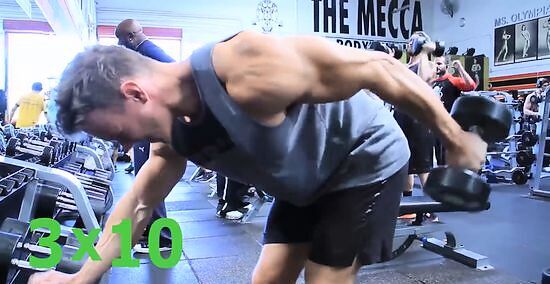
Do three sets of 10 reps. Rest for 60 seconds in between sets. Do 2 sessions per week. If ten is too many, drop down to five and increase at each session. You know you are doing the right number of reps when the last one is difficult to complete.
Monitoring Diet and Nutrition
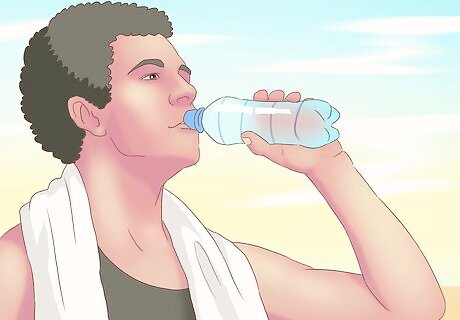
Drink more water. Water does more than just hydrate you - it helps you shed body fat by providing the medium for rapid cellular changes to occur. The more fat you shed, the more visible your triceps muscles will be. Drinking lots of water also helps you eat less by making you feel full and naturally detoxes your body. It is recommended that you drink at least 1 ounce of water per 2 pounds of bodyweight (or 30 ml per kg) every day to help you shed excess body fat.
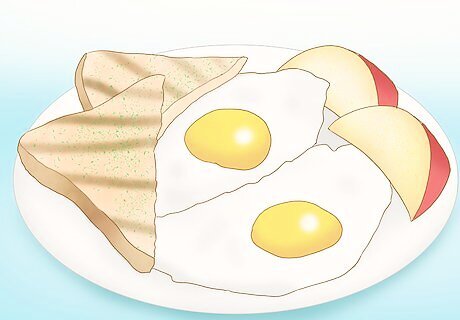
Eat a healthy breakfast every day. Many people tend to skip breakfast, but it's one of the easiest ways to get your metabolism revved up for the day. Research has shown that regularly eating a good breakfast helps you both lose excess fat and keep it off. Aim for a breakfast that includes about 30-40 grams of protein. For a balanced meal, make sure to include a complex carbohydrate like oatmeal. Add a piece of fruit into the mix for an ideal, balanced breakfast.
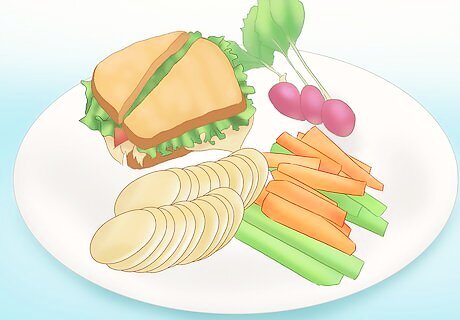
Eat 5-6 small meals each day. Don't up your calorie intake, but instead find ways to eat the same amount of calories spread out over 5 or 6 smaller meals. Eating more frequently revs up your metabolism, allowing you to burn more fat than when you were eating 3 meals per day. The steady intake of calories throughout the day will also help you feel more energetic. When you're feeling energetic, you burn more calories! However, you should also leave 12 hours between your first meal and your last meal.
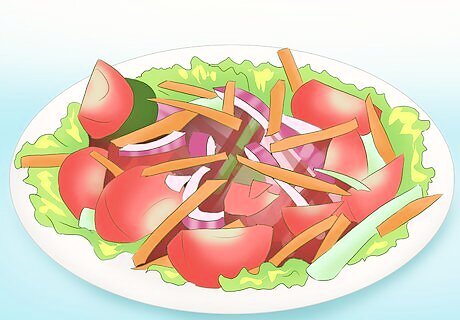
Consume five servings of vegetables every day. Vegetables are jam-packed with nutrients that your body needs. Since they are also very low in calories, vegetables provide your body with the most nutrition for the least amount of calories. Eating plenty of veggies also helps you feel full, so that you end up eating less at every meal.
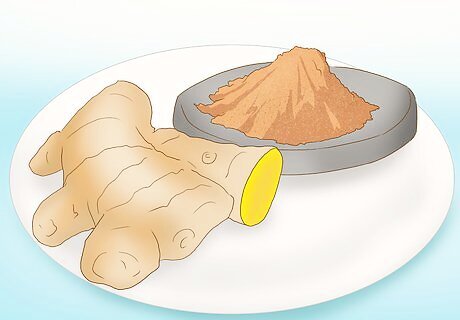
Spice things up. Adding particular kinds of spices to your meals can kick your metabolism into high gear and keep your metabolic rates high. Cayenne pepper, garlic, cinnamon, black pepper, mustard seeds, powdered onion and ginger are some of the best spices for stimulating the metabolism.



















Comments
0 comment